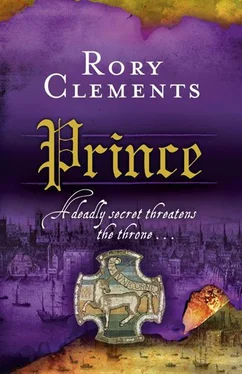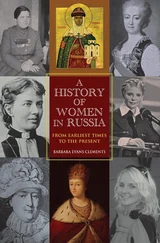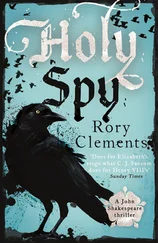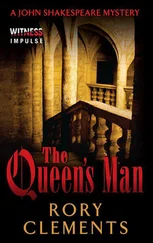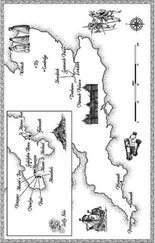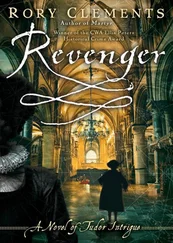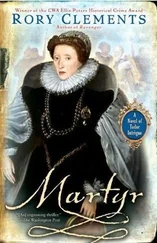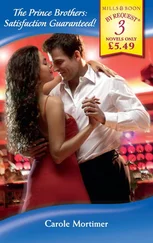Rory Clements - Prince
Здесь есть возможность читать онлайн «Rory Clements - Prince» весь текст электронной книги совершенно бесплатно (целиком полную версию без сокращений). В некоторых случаях можно слушать аудио, скачать через торрент в формате fb2 и присутствует краткое содержание. Жанр: Исторический детектив, на английском языке. Описание произведения, (предисловие) а так же отзывы посетителей доступны на портале библиотеки ЛибКат.
- Название:Prince
- Автор:
- Жанр:
- Год:неизвестен
- ISBN:нет данных
- Рейтинг книги:5 / 5. Голосов: 1
-
Избранное:Добавить в избранное
- Отзывы:
-
Ваша оценка:
- 100
- 1
- 2
- 3
- 4
- 5
Prince: краткое содержание, описание и аннотация
Предлагаем к чтению аннотацию, описание, краткое содержание или предисловие (зависит от того, что написал сам автор книги «Prince»). Если вы не нашли необходимую информацию о книге — напишите в комментариях, мы постараемся отыскать её.
Prince — читать онлайн бесплатно полную книгу (весь текст) целиком
Ниже представлен текст книги, разбитый по страницам. Система сохранения места последней прочитанной страницы, позволяет с удобством читать онлайн бесплатно книгу «Prince», без необходимости каждый раз заново искать на чём Вы остановились. Поставьте закладку, и сможете в любой момент перейти на страницу, на которой закончили чтение.
Интервал:
Закладка:
‘Take a look at Mr Frizer’s head. That’s how Marlowe hurt himself.’
Shakespeare turned away and clapped Peace about the shoulder. ‘I want you here at the inquest, Joshua.’
He shook his head. ‘No. I’ll write you a report. That’ll be enough for Danby. It’s straightforward.’
‘Put in the time of death as you estimate it.’
‘Oh yes, I’ll do that. But Danby will pay it no heed.’
The witnesses did not leave the premises for a day and two nights. An obliging Mrs Bull, owner of the house, bustled about bringing them food and ale, and provided a bed for them in another room. Two of the men slept on the outer sides of the bed, heads against the wall, while the third, Skeres, slept in between them, his booted feet against their ears, his farting, snoring bulk hogging much of the mattress.
The body of Marlowe was as cold as earth by the time the sixteen-man jury of local Deptford yeomen was assembled in the room where he had died. The jurors stood along one wall, heads bowed and fearful, clutching their caps and looking anywhere but at the body. Then the coroner appeared, a dark and formal cape about his shoulders and a fur hat under his arm. He sat at the table and called the room to order for the Lord’s Prayer. At the coroner’s side, Richard Topcliffe, the Queen’s servant, took a seat, his white hair and dread face caught in the morning light from the little window.
John Shakespeare stood close to the doorway. He glared at Topcliffe, who smirked back. What was Topcliffe doing here, close-coupled with the coroner? This inquest could be none of his concern.
The proceedings were as Shakespeare expected; there was no one to gainsay the testimony of Poley, Skeres and Frizer, who all knew their lines well. William Danby, coroner to the royal court, then attending on the Queen less than a mile away in Greenwich, listened impassively. His manner was grave. He read Joshua Peace’s report, which had been placed on the table in front of him, then set it aside without commenting on it to the jury.
For a moment, Shakespeare considered interrupting the inquest to point out the discrepancy over the time of the killing. But it would have been a waste of breath. Danby would merely have instructed the jurors to discount the testimony of Mr Peace, as he himself had done, and might well have thrown Shakespeare out of the hearing. And anyway, the hour of death, in itself, proved nothing. It was the manner of the killing that counted for all in this room.
The verdict was a foregone conclusion: self-defence. The jurors — each of whom had been required to step forward in turn to view the body and the fatal wound at close quarters — had done the job required of them. Ingram Frizer was to be taken to the Marshalsea prison to see whether he should be charged or no. That was the prerogative of the Queen and her ministers.
It was not the verdict which caused Shakespeare most consternation, it was the presence of the man who had sat at the coroner’s side: Richard Topcliffe — killer, torturer, rapist, blood-lusting dog with the ear of the Queen.
The loathing between Shakespeare and Topcliffe ran deep. Their paths had crossed too many times over the years. Shakespeare had married a Catholic and Topcliffe wanted his blood. He wanted the blood of every Catholic in England. And who was to stop him when he had Elizabeth’s licence to act as priest hunter and persecutor? No man could oppose him, not even the Privy Council, because he was answerable only to her.
As the jury shuffled out, Shakespeare approached the table. Danby was collecting up his papers.
‘You know, of course, Mr Danby, that they were all lying.’
The coroner looked up, eyes wide, as if he had not seen Shakespeare before. ‘Mr Shakespeare?’
‘Frizer, Poley, Skeres. They concocted that story. And the time of the killing. You had Mr Peace’s note in front of you, yet you paid it no heed.’
Danby bridled, though his indignation would not have alarmed a mole. Indeed, he was much like a burrowing creature with his dark cape, nervous eyes and twitching whiskers. ‘You presume much to speak to a royal officer so, Mr Shakespeare. In truth I would go further, sir; you presume a great deal to call in the Searcher of the Dead without my authority.’
‘If I had waited on your pleasure, Mr Danby, it might have been too late. The body would have been as cold as winter. Mr Peace might not have been able to determine the time of death with such accuracy.’
‘It is for me to say how accurate Mr Peace’s conclusions are. And I say that he is a diabolical dabbler. He plays with dead bodies in a most unchristian way. I will have none of Mr Peace.’ Danby swept past Shakespeare, then paused at the door. ‘And mark me well: I will have words with my lord Burghley regarding your part in this.’ With a final, puffed-up flourish, he departed.
Topcliffe bared his yellow teeth and chuckled. He prodded Shakespeare’s chest with his silver-tipped blackthorn stick. ‘That’s told you, Shakespeare.’
Shakespeare brushed the stick aside with a sweep of his arm and glared into Topcliffe’s gloating face. ‘God blind you,’ he said. ‘You are a malign presence.’ This whole business was putting Shakespeare in an ill humour. He had not liked it from the start, when Cecil had ordered him to inquire into Marlowe’s dealings. Anyone could have written those placards. And if it had been Marlowe, why would he have signed it Tamburlaine? Only a fool would draw attention to himself in such a way — and Marlowe, however hot-blooded and wild, had never been a fool.
‘Now, now, Mr Shakespeare,’ Topcliffe said, putting up his stick as if it were a rapier. ‘Hear me out.’
‘I want to hear nothing from you, Topcliffe. Have you not women or children to torment somewhere?’
‘Wait, Shakespeare. I know we do not see eye to eye on much, but I have to tell you that I am with you on this. Marlowe was a dunghill of iniquity, but he had his fair parts. The verdict was wrong, I am certain. He was murdered.’
‘Then why did you say nothing?’
‘I had no evidence, Mr Shakespeare. Why did you say nothing?’
Shakespeare ignored the question. ‘And what was Marlowe to you, anyway? Why are you here?’
Topcliffe took a smouldering pipe from the pocket of his fine doublet and thrust it in his mouth. He sucked hard and blew out two thin streams of smoke from his nostrils. ‘Marlowe? I would happily have drawn out his entrails and hacked off his pizzle like a Papist girl-boy for his godless ways and playmaking. And yet — ’ Topcliffe’s menacing growl almost softened for a moment. ‘And yet I will admit, in other things his heart was right. His denunciation of the foreign incomers was something that should gladden all English hearts, for who can stomach these strangers overrunning our land, taking bread from stout English tables? Five years ago, Drake sank the strangers who tried to invade our shores. Now the Council welcomes so many ragtag beggars from France and the Low Countries that you scarce hear an English voice in London. Marlowe was right and I am with him. I would push every last one of them back into the narrow seas and cheer their drowning.’
The pall-bearers entered the room and lifted the body of Christopher Marlowe from the day bed to carry him away for burial.
Shakespeare turned away. Topcliffe understood nothing. This was not about Marlowe’s views, this was about murder. The trouble was that in these days of famine and rising prices, when many men could not find a day’s work, there were plenty who thought like Topcliffe, plenty who would do evil to the incomers and their wives and children, Catholic or Protestant. Their only crime? Not being English.
Chapter 3
Outside Mrs Bull’s house on Deptford Strand a small crowd had gathered, perhaps fifteen strong. Shakespeare was taken aback to see his brother Will among them, with a group of familiar faces from the playhouses. Henslowe was there, Alleyn and Burbage, an uncommonly doleful Will Kempe, his customary jest and smile absent today. Marlowe’s patron, the poetry-loving Thomas Walsingham, stood tall and stiff with the little group. Nephew to Shakespeare’s late employer, Sir Francis Walsingham, Thomas cut an elegant, mournful figure. He smiled wanly at Shakespeare. George Peele, the poet and playmaker, cut an equally desolate figure in an outrageously costly doublet and hose of green and gold satin that would not have been out of place at court.
Читать дальшеИнтервал:
Закладка:
Похожие книги на «Prince»
Представляем Вашему вниманию похожие книги на «Prince» списком для выбора. Мы отобрали схожую по названию и смыслу литературу в надежде предоставить читателям больше вариантов отыскать новые, интересные, ещё непрочитанные произведения.
Обсуждение, отзывы о книге «Prince» и просто собственные мнения читателей. Оставьте ваши комментарии, напишите, что Вы думаете о произведении, его смысле или главных героях. Укажите что конкретно понравилось, а что нет, и почему Вы так считаете.
